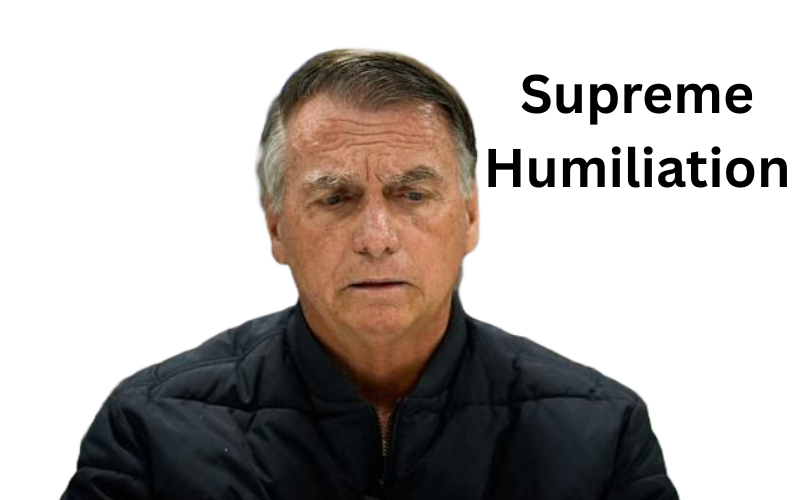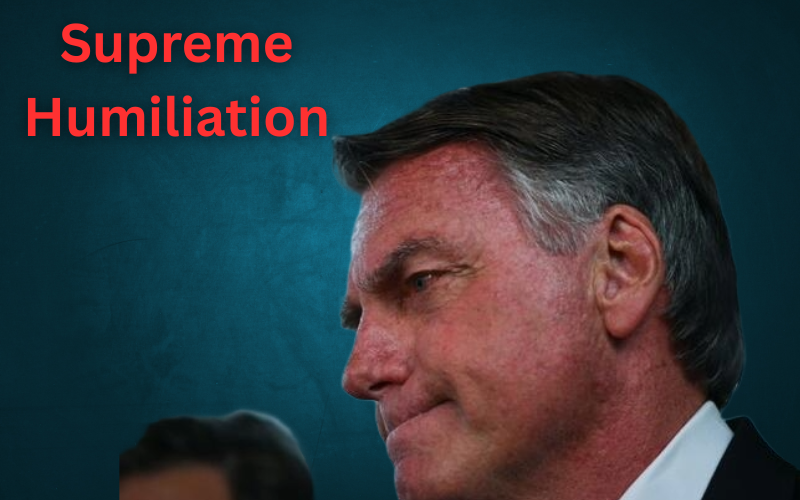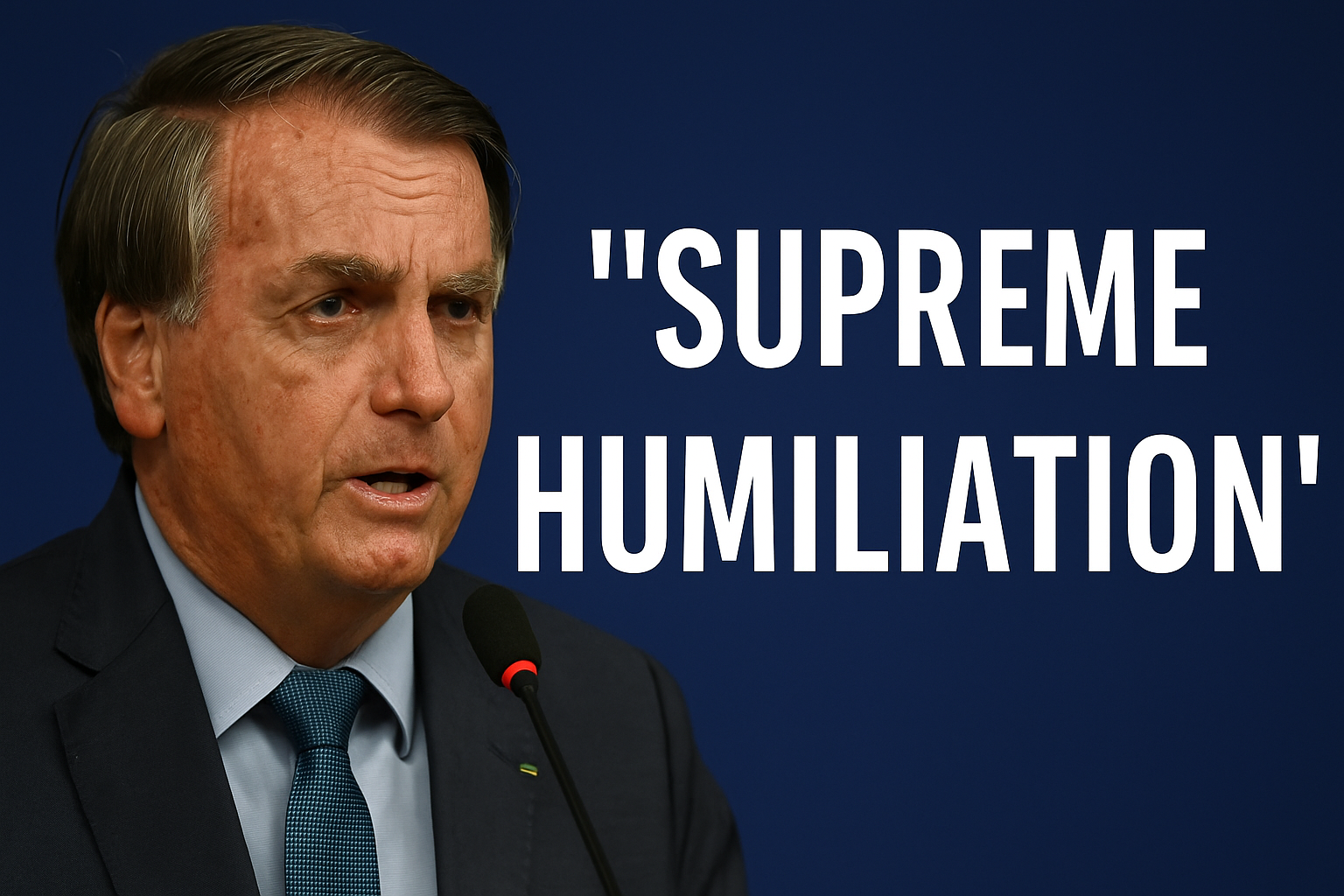Jair Bolsonaro Condemns Supreme Court’s Ankle Monitor Order as ‘Supreme Humiliation’ Amid Explosive Criminal Trial

Brazil’s former President Jair Bolsonaro has once again ignited a firestorm of controversy, this time by fiercely condemning the Supreme Federal Court’s (STF) decision to impose an electronic ankle monitor on him. Labeling the move as a “Supreme Humiliation,” Bolsonaro claims the court’s order is a politically motivated effort to shame and silence him in the face of mounting legal pressures. The episode has not only divided Brazil politically but also sparked fierce global debate over the boundaries of judicial power and political retaliation.
The focus keyword “Supreme Humiliation” encapsulates the former president’s outrage. With tensions soaring in the Brazilian political landscape, this incident has drawn sharp responses from Bolsonaro’s loyal base as well as scathing critiques from his opponents. In a nation still healing from a polarized election, this latest development threatens to unravel any semblance of political cohesion.
Bolsonaro’s allies argue that his treatment represents a stark departure from Brazil’s democratic values. They have questioned the STF’s neutrality and suggested that the court’s decisions reflect partisan interests more than judicial prudence. The phrase Supreme Humiliation has since been echoed by senators, lawmakers, and thousands of demonstrators, evolving into a cultural and political slogan. As the case unfolds, Bolsonaro’s accusations of judicial overreach intensify, further inflaming tensions across all levels of society.
Judiciary Power vs Political Strategy: Bolsonaro’s Legal Battle Intensifies
The former president has been under intense scrutiny for a slew of allegations, ranging from abuse of power to inciting insurrection and electoral disinformation. But it is the Supreme Court’s recent ankle monitor mandate that pushed him to publicly decry the court’s authority. Bolsonaro labeled the move as a targeted attempt to destroy his image, stating that no president in Brazil’s democratic history has endured such a level of “Supreme Humiliation.”
In an emotional address, Bolsonaro emphasized that he views the ankle monitor as more than just a security measure—it is, according to him, a calculated attempt to degrade and delegitimize his legacy. He asserted that the action signals a new phase of persecution against conservative ideals and his political agenda.
The focus keyword, Supreme Humiliation, has been trending across social platforms and political commentary shows, with supporters echoing Bolsonaro’s sentiments and critics asserting the court is merely upholding the law. This ideological divide continues to polarize the nation.
For Bolsonaro, the trial isn’t just about guilt or innocence—it’s about legacy, influence, and his enduring political relevance. He sees the ankle monitor not as a legal precaution, but as a symbolic branding of criminality aimed at erasing everything he represents. The use of Supreme Humiliation to describe his situation has gained traction in both conservative and centrist circles.
Ankle Monitor Symbolism: A Tool of Law or Public Shaming?
Ankle monitors, typically reserved for individuals under house arrest or pending trial, are rarely used on former heads of state. Legal experts are divided on whether the STF’s order was justifiable or excessive. Some view it as necessary to ensure Bolsonaro’s compliance with ongoing investigations, while others argue that it is unprecedented and extreme, a clear sign of Supreme Humiliation.
Legal scholars note that while the court may have the authority to enforce such measures, using them against a former president introduces a perilous precedent. In Bolsonaro’s case, the symbolism of the ankle monitor—broadcasted on live news and replayed endlessly—has become a global image of Supreme Humiliation in action.
His defense team is now preparing to file appeals challenging the constitutionality of the order, arguing that it violates Bolsonaro’s basic rights and dignities. His legal counsel, led by former Justice Minister André Mendonça, has accused the judiciary of overstepping its mandate and engaging in what they call a “judicial vendetta.”
The use of the phrase Supreme Humiliation is not just rhetoric—it’s a strategic narrative being employed to cast Bolsonaro as a victim of political injustice and to rally his base. As the legal wrangling unfolds, the Brazilian public is forced to reconcile legal authority with political loyalty.
Bolsonaro’s attorneys are also exploring whether international human rights courts might intervene, citing violations of due process and human dignity. If such efforts succeed, they could set a precedent that may reverberate across the democratic world, where political trials of former leaders are becoming increasingly common.
Global Reactions and Political Implications of the ‘Supreme Humiliation’
World leaders and political analysts are closely monitoring the developments. Some leaders from conservative governments have expressed dismay at the STF’s order, calling it a politically charged act. Meanwhile, human rights organizations have voiced concerns about the legal precedent it may set.
Domestically, the impact has been seismic. Bolsonaro’s supporters view the Supreme Court’s move as an egregious overreach, one that will galvanize their base. On the other hand, critics argue that Bolsonaro’s own actions, including his controversial stance on Brazil’s election systems and COVID-19 management, warrant accountability—no matter how “Supreme Humiliation” it may bring.
The focus keyword continues to dominate public discourse. Headlines in Brazilian media repeat the phrase “Supreme Humiliation,” highlighting the court’s stern measures and the emotional fallout engulfing Bolsonaro’s camp.
Bolsonaro has called upon international institutions, including the UN and OAS, to observe and intervene if necessary. Though their responses have been measured, the diplomatic stir underscores how the term Supreme Humiliation has transcended national borders and entered global political vocabulary.
Social justice groups in Brazil have also weighed in. Some argue that Bolsonaro’s cries of Supreme Humiliation are a strategic distraction from the gravity of the accusations against him. Others see it as a genuine reflection of a broader power struggle between Brazil’s branches of government.
Public Outcry and The Rise of the ‘Supreme Humiliation’ Movement
The public response to the STF’s ruling has been dramatic. Supporters of Jair Bolsonaro have staged rallies across multiple cities, chanting slogans denouncing the STF and waving banners reading “Stop the Supreme Humiliation.” The streets of São Paulo, Rio de Janeiro, and Brasília have witnessed thousands marching in protest, demanding judicial transparency and an end to what they see as a coordinated attack on a democratically elected former leader.
The movement surrounding “Supreme Humiliation” has morphed into more than just a defense of Bolsonaro—it’s become a symbol of perceived injustice and resistance against an establishment that many feel has grown too powerful and unchecked. The phrase has now found its way onto t-shirts, flags, and digital avatars, cementing itself as the motto of Bolsonaro’s political resurrection.
Meanwhile, mainstream media coverage has fueled both sympathy and outrage. Major Brazilian networks, including Globo and Record TV, have debated the STF’s legal basis while also questioning Bolsonaro’s moral high ground. Social media influencers, political commentators, and international observers have all weighed in, some calling the ordeal a landmark case in Brazilian democratic history, others labeling it a circus of political deflection.
Public intellectuals have also entered the fray. Celebrated authors, journalists, and professors have hosted forums dissecting the implications of Supreme Humiliation, adding layers of socio-political analysis that deepen the national debate. Podcasts and YouTube channels with millions of followers are dedicating entire episodes to unpacking the STF’s ruling and Bolsonaro’s counter-offensive.
The Psychological and Personal Toll of the ‘Supreme Humiliation’
Sources close to the former president describe him as emotionally distressed, labeling this ordeal as one of the darkest moments of his post-presidency life. Bolsonaro reportedly told aides that he has never experienced such public Supreme Humiliation, not even during the most turbulent episodes of his presidency.
His supporters have taken to social media, using the hashtag #SupremeHumiliation to share their frustration and anger. Memes, artwork, and passionate essays flood platforms like X (formerly Twitter), Instagram, and Telegram. The movement around this keyword appears to be growing into a cultural phenomenon, framing Bolsonaro not just as a politician under fire but as a martyr of judicial aggression.

Despite the growing sympathy from parts of the population, legal analysts warn that invoking Supreme Humiliation cannot serve as a defense in court. The legal process will proceed based on evidence and due procedure, irrespective of public sentiment. However, political observers note that emotional narratives like these often carry weight in electoral battles, especially when used to shape the media narrative.
The emotional toll on Bolsonaro’s family has also been significant. Reports suggest that close relatives, including his wife Michelle Bolsonaro, have privately expressed concern over the psychological strain. Conservative faith leaders have offered prayers and public support, reinforcing the moral dimension of what they too have described as a Supreme Humiliation.
Election Prospects in the Shadow of ‘Supreme Humiliation’
As 2026 draws nearer, the question on everyone’s mind is whether Bolsonaro can recover politically. Many believe that this very episode of Supreme Humiliation might propel him back into the limelight. His base has remained mostly intact, and the outrage sparked by the ankle monitor has reenergized a faction that had grown quiet post-election.
Political scientists suggest that Bolsonaro could spin this situation to his advantage by portraying himself as a resilient fighter against a corrupt establishment. The keyword Supreme Humiliation has thus become more than an insult—it’s a tool for narrative building. This narrative is expected to be central to his next campaign, should he be legally allowed to run again.
However, the road ahead is fraught with legal challenges. Bolsonaro still faces over a dozen other cases, ranging from financial misconduct to illegal campaign activities. Whether he can simultaneously manage these accusations and launch a viable campaign remains to be seen.
Opinion polls suggest that while a majority of Brazilians believe in upholding the rule of law, a significant portion also sympathizes with Bolsonaro’s claim of being targeted. If the Supreme Humiliation narrative holds sway, it could split the electorate once again, possibly leading to another divisive election.
International Law and the ‘Supreme Humiliation’ Debate
International observers have begun to analyze Brazil’s judicial treatment of Bolsonaro through the lens of global legal standards. Comparisons are being made with other countries where former leaders were subjected to trial, from South Korea’s Park Geun-hye to South Africa’s Jacob Zuma. In many of these cases, the balance between justice and political retribution was questioned.
Human rights watchdogs have raised alarms, suggesting that even if Bolsonaro deserves investigation, the optics of the STF’s move may reflect poorly on Brazil’s democracy. They argue that such acts of Supreme Humiliation can erode trust in institutions and weaponize justice for political ends.
On the other hand, defenders of the STF argue that no one, not even a former president, should be above the law. They maintain that the term “Supreme Humiliation” is a mischaracterization of a legal process meant to uphold accountability.
The tension between national sovereignty and international law is becoming increasingly evident. Some Brazilian lawmakers are advocating for reforms that would prevent future incidents of perceived Supreme Humiliation, including judicial oversight committees and clearer legislative boundaries for court interventions.
Conclusion: A Nation at a Crossroads Amid ‘Supreme Humiliation’
As Brazil grapples with the implications of this historic moment, one thing is clear—the STF’s decision has unleashed a wave of political and social unrest that may define the country’s democratic future. Whether Jair Bolsonaro emerges from this storm strengthened or defeated remains to be seen.
But in the court of public opinion, the phrase “Supreme Humiliation” has already left a mark. It has exposed the fragility of political power, the influence of media narratives, and the contentious intersection of law and leadership.
Bolsonaro’s trial will continue in the coming months, and with it, the debate around justice, accountability, and Supreme Humiliation will likely escalate. It is a chapter not just in Bolsonaro’s life but in the evolving story of Brazilian democracy.
Stay tuned for further updates as this high-stakes legal and political drama unfolds. Brazil stands at a crossroads, where Supreme Humiliation may very well reshape its political destiny.

